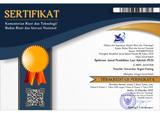Relationship Between Andragogy Trainer Competencies With the Motivation to Learn Training Participants Third Public Speaking Padang
 ), Wirdatul Aini(2),
), Wirdatul Aini(2), (1) Universitas Negeri Padang
(2) Universitas Negeri Padang
 Corresponding Author
Corresponding Author
DOI : https://doi.org/10.24036/spektrumpls.v8i4.110183
Full Text:
 Language : en
Language : en
Abstract
This research is motivated by the low learning motivation of the Haus Public Speaking training participants in Padang City, this is presumably because it has something to do with the andragogical competence of the Trainer in the Haus Public speaking Training in Padang City. This study aims to see an overview of the andragogical competence of the trainer, the description of learning motivation, and the relationship between the andragogical competence of the trainer and the learning motivation of the participants in the Haus Public Speaking training in Padang City. The approach to this research is quantitative with descriptive correlational research. The population in this study was 25 participants in the Haus Public Speaking training in Padang City and a sample of 70%, namely 17 people. The sampling technique was random sampling. In this study, data collection using a questionnaire or questionnaire with the data collection tool in the form of a questionnaire guide. The data analysis technique in this study used a percentage formula and rank-order correlation. The results of this study indicate that the andragogical competence of the trainer is quite low, the learning motivation of the participants is still low, and there is a significant relationship between the andragogical competence of the trainer and the learning motivation of the public speaking training participants. Suggestions are to the managers of the public speaking training program to further improve the quality of learning in public speaking training. To trainers, so they can improve their competence as educators, especially andragogical competence in public speaking training. It is hoped that in other studies, we can see some other factors that have not been examined in this study.
Keywords: Andragogical Competence, Learning Motivation
References
Aini, W. (2006). Konsep Pendidikan Luar Sekolah. Padang: PLS FIP UNP.
Amsy, N., & Aini, W. (2019). Hubungan Suasana Belajar denngan Motivasi Belajar Ibu-ibu Mengkuti Kegiatan Majelis Taklim. JFACE: Journal of Family, Adult, and Early Childhood Education, 1(3), 307–314. https://doi.org/10.5281/zenodo.3592513
Aqmala, D. (2007). Analisis Faktor-faktor yang Mempengaruhi Efektivitas Pelatihan Penjualan dan Kompetensi Relasional untuk Meningkatkan Kinerja Tenaga Penjualan (Studi Kasus pada Tenaga Penjualan Asuransi Bumi Asih Jaya di Jawa Tengah). Universitas Diponegoro. Retrieved from core.ac.uk › download › pdf%0A
Arikunto, S. (2016). Prosedur Penelitian: Suatu Pendekatan Praktik. Jakarta: Rineka Cipta.
Basleman, Anisah & Mappa, S. (2011). Teori Belajar Orang Dewasa. Bandung: PT. Remaja Rosdakarya Offset.
Efendi, Y. K. (2017). Pelaksanaan Program Pendidikan Pelatihan di Dinas Tenaga Kerja Transmigrasi dan Kependudukan Pemerintah Propinsi Jawa Timur. Jurnal Khazanah Pendidikan, 10(2). Retrieved from https://media.neliti.com/media/publications/144496-ID-pelaksanaan-program-pendidikan-pelatihan.pdf
Gita, I. G. A. A. A. R., & Sariyathi, N. K. (2016). Pengaruh Lingkungan Kerja, Self-Efficacy, dan Karakteristik Peserta Pelatihan terhadap Transfer Pelatihan pada Karyawan PT. Indonesia Power. E-Jurnal Manajemen Unud, 5(7), 4602–4629. Retrieved from simdos.unud.ac.id › uploads › file_penelitian_1_dir%0A
Hamalik, O. (2007). Manajemen Pelatihan Ketenagakerjaan dengan Pendekatan Terpadu. Jakarta: Bumi Aksara.
Hardian, C., & Lathifah, A. (2018). Pengaruh Kompetensi SDM Kearsipan terhadap Kualitas Layanan Arsip Statis di Dinas Arsip dan Perpustakaan Provinsi Jawa Tengah. Jurnal Ilmu Perpustakaan, 7(1), 161–170. Retrieved from https://ejournal3.undip.ac.id/index.php/jip/article/view/22827
Hiryanto, H. (2017). Pedagogi, Andragogi dan Heutagogi serta Implikasinya dalam Pemberdayaan Masyarakat. Jurnal Dinamika Pendidikan, 22(1), 65–71. Retrieved from journal.uny.ac.id › index.php › article › download%0A
Kamil, M. (2012). Model Pendidikan dan Pelatihan (Konsep dan Aplikasi). Bandung: Alfabeta.
Kamus Besar Bahasa Indonesia. (n.d.). Kompetensi. Retrieved from https://kbbi.kemdikbud.go.id/entri/kompetensi
Kusumastuti, Y. H. (2018). Pengaruh Pelatihan, Motivasi, dan Tingkat Pendidikan terhadap Kompetensi Peserta Didik pada LPK Alfabank Yogyakarta. Universitas Negeri Yogyakarta.
Malik, H. K. (2008). Teori Belajar Andragogi dan Aplikasinya dalam Pembelajaran. Jurnal Inovasi, 5(2), 1–16. Retrieved from ejurnal.ung.ac.id › index.php › JIN › article › download%0A
Nugrahani, D., Kustantinah, I., Himatu K., R. F., & Larasati, L. (2012). Peningkatan Kemampuan Public Speaking Melalui Metode Pelatihan Anggota Forum Komunikasi Remaja Islam. E-Dimas: Jurnal Pengabdian Kepada Masyarakat, 3(1). https://doi.org/10.26877/e-dimas.v3i1.246
Peraturan Pemerintah. No.19 Tahun 2005 tentang Standar Nasional Pendidikan Pasal 28 Ayat (3).
Saprianto, D., & Solfema, S. (2019). Gambaran Penerapan Prinsip Andragogi dalam Performansi Widyaiswara pada Kegiatan Pendidikan dan Pelatihan. JFACE: Journal of Family, Adult, and Early Childhood Education, 1(3), 293–300. https://doi.org/10.5281/zenodo.3406694
Sardiman. (2012). Interaksi dan Motivasi Belajar Mengajar. Jakarta: RajaGrafindo Persada.
Sudjana, D. (2004). Pendidikan Non Formal Wawasan Sejarah Perkembangan, Filsafat dan Teori Pendukung serta Asas. Bandung: Falah Production.
Undang-Undang Nomor 13 Tahun 2003. tentang Ketenagakerjaan Pasal 1 ayat 10.
 Article Metrics
Article Metrics
 Abstract Views : 311 times
Abstract Views : 311 times
 PDF Downloaded : 92 times
PDF Downloaded : 92 times
Refbacks
- There are currently no refbacks.

This work is licensed under a Creative Commons Attribution-NonCommercial 4.0 International License.



